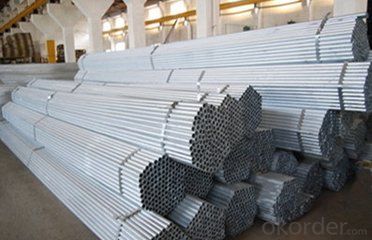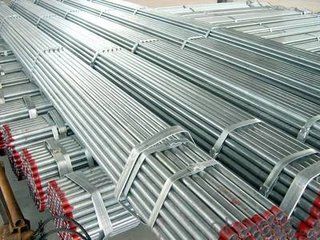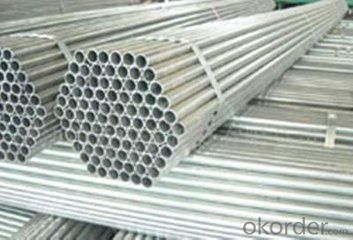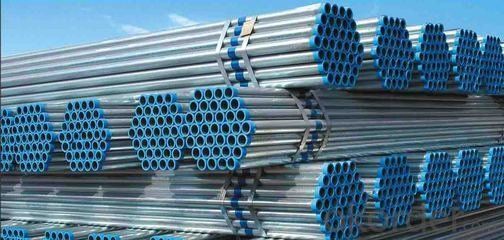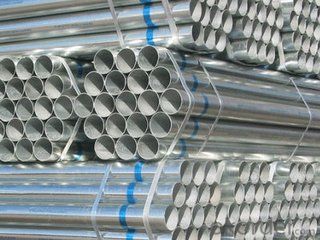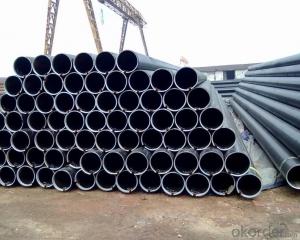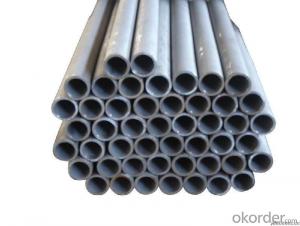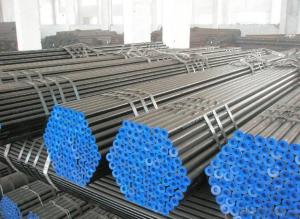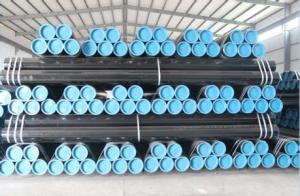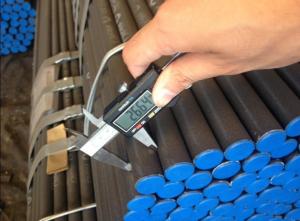3/4” Hot selling low price ASTM A179 Gr.C seamless carbon steel pipe
- Loading Port:
- Tianjin
- Payment Terms:
- TT OR LC
- Min Order Qty:
- 10 m.t.
- Supply Capability:
- 100000 m.t./month
OKorder Service Pledge
OKorder Financial Service
You Might Also Like
Specifications
HOT-DIP GALVANIZED PIPE FOR FLUID TRANSPORTATION
1.OD:33.4-114.3mm
2.WT:2.0-9.0mm
3.Zinc:200~600g/m2
Good serveice
We Offer You:
HOT-DIP GALVANIZED PIPE FOR FLUID TRANSPORTATION
HOT-DIP GALVANIZED PIPE FOR FLUID TRANSPORTATION | |||
1. Material | Steel Grade | Q195, Q235, Q345 etc. | |
Material Type | Available in cold rolled and hot rolled | ||
2. Size | W.T | 1.0mm-12mm | |
Diameter | 20mm~273mm | ||
Length | 5.8m-14m | ||
3. Zinc Coating | 200~600g/m2, could be thicker or thinner if you need | ||
4. Certification | BV, IAF, SGS,COC, ISO etc. | ||
5. Welding Technology | Longitudinal ERW | ||
6. Application | Urban construction, machine structure, agriculture equipment, water and gas pipes etc. | ||
7. Packing | Packing in bundle with steel strips; with seaworthy package at the end; could be done with your requirement. | ||
8. Delivery Time | Usually within 10-30 days after receipt of deposit, ASAP | ||
9. Trade Terms | FOB, CFR, CIF etc. | ||
10. Payment Terms | T/T, L/C etc. | ||
11. Loading Port | Xingang , Tianjin | ||
12. Original Place | Tianjin, China | ||
13. Company Information | Name | Reliance Metal Resource Co., Ltd | |
Type | Manufacture and trading company | ||
Supply Ability | 360,000 tons per year | ||
Galvanized Round Steel Pipe's Materials
| Elements Material | Chemical Compsition% | Mechanical Property | ||||||
| C% | Mn% | S% | P% | Si% | Yield Point (Mpa) | Tensile Strength(Mpa) | Elongation (%) | |
| Q195 | 0.06-0.12 | 0.25-0.50 | <0.050< span=""> | <0.045< span=""> | <0.030< span=""> | >195 | 315-430 | 32-33 |
| Q215 | 0.09-0.15 | 0.25-0.55 | <0.05< span=""> | <0.045< span=""> | <0.030< span=""> | >215 | 335-450 | 26-31 |
| Q235 | 0.12-0.20 | 0.30-0.70 | <0.045< span=""> | <0.045< span=""> | <0.030< span=""> | >235 | 375-500 | 24-26 |
| Q345 | <0.20< span=""> | 1.0-1.6 | <0.040< span=""> | <0.040< span=""> | <0.55< span=""> | >345 | 470-630 | 21-22 |
- Q: How do you determine the required wall thickness for steel pipes?
- The required wall thickness for steel pipes is determined by considering various factors such as the internal pressure, external loads, pipe material, and the desired safety factor. This is typically calculated using engineering principles, industry standards, and specific pipe design codes to ensure the pipe can withstand the anticipated conditions without failure or deformations.
- Q: Will the steel tube dance?
- The steel tube dance tube has a rotating steel tube and a fixed steel tube, so that different types of steel pipe can be chosen according to the type of pipe dance performed by the dancer.
- Q: Can steel pipes be used for conveying compressed air?
- Yes, steel pipes can be used for conveying compressed air. Steel pipes are known for their high strength and durability, making them suitable for handling high-pressure applications such as compressed air systems. Additionally, steel pipes are resistant to corrosion and can withstand extreme temperatures, making them a reliable choice for conveying compressed air.
- Q: How are steel pipes used in the construction of geothermal power plants?
- Steel pipes are used in geothermal power plants for various purposes, including the transport of geothermal fluids from the underground reservoir to the surface, the distribution of these fluids within the plant, and the construction of the plant's infrastructure, such as the well casing and steam piping.
- Q: What are the safety precautions for handling steel pipes?
- To prevent accidents and minimize the risk of injury when dealing with steel pipes, it is crucial to implement various safety measures. Consider the following key safety precautions: 1. Personal Protective Equipment (PPE): Ensure that you wear suitable PPE, such as safety glasses, hard hats, steel-toed boots, and gloves. This will shield you from potential hazards, including falling objects, sharp edges, or chemical spills. 2. Proper Lifting Techniques: Employ correct lifting techniques to avoid strain or back injuries when lifting steel pipes. Bend your knees, maintain a straight back, and use your legs instead of your back to lift. Seek assistance or employ mechanical lifting equipment if the pipe is too heavy. 3. Secure Storage and Stacking: Organize the storage of steel pipes meticulously, ensuring that they are stacked and secured appropriately. Utilize suitable storage methods like racks or pallets to prevent pipes from rolling or falling. Avoid excessive stacking to maintain stability. 4. Inspect for Defects: Prior to handling steel pipes, examine them for defects like cracks, corrosion, or dents. Identifying and removing defective pipes is vital as they can pose serious safety risks. 5. Use Appropriate Handling Equipment: When moving or transporting steel pipes, make use of suitable equipment like forklifts, cranes, or hoists. Verify that the equipment is in good working condition and always adhere to the manufacturer's guidelines for safe operation. 6. Secure Transportation: When transporting steel pipes by vehicle, ensure that they are securely fastened to prevent shifting or falling during transit. Use restraints like straps or chains to secure the load. 7. Watch for Sharp Edges: Exercise caution when handling steel pipes as they may have sharp edges that can cause cuts or injuries. Wear gloves to protect your hands. 8. Communication and Training: Establish effective communication with your team members to ensure that everyone understands the correct handling procedures and safety precautions. Conduct training sessions on safe lifting techniques, equipment operation, and hazard identification. 9. Maintain a Clean Work Area: Keep the work area clean and free from debris, oil, or other slippery substances that may lead to slips or falls. 10. Follow Safety Guidelines: Always adhere to safety guidelines and procedures set by your organization or relevant regulatory authorities. These guidelines may include additional precautions specific to your work environment. By diligently following these safety precautions, you can significantly reduce the likelihood of accidents and injuries when handling steel pipes. Remember, prioritizing safety is paramount in any work environment.
- Q: Is the electric pipe used with steel pipe or PVC pipe?
- In industrial designs, galvanized steel tubes are generally used for laying electric tubes, especially in the case of explosion protection.The benefits of galvanized steel pipe is not easy to damage, can prevent the destruction and damage of environmental forces to a certain extent, a junction box, check for export, export lines and other accessories, construction and maintenance in explosion-proof environment can be exempted from hot work. The disadvantage is higher cost.The PVC tube is less costly, but less impact resistant.
- Q: Can steel pipes be recycled after their useful life?
- Yes, steel pipes can be recycled after their useful life. Steel is a highly recyclable material, and this includes steel pipes. Recycling steel pipes involves collecting the used pipes, cleaning them to remove any contaminants, and then processing them into new steel products. The recycling process helps to conserve natural resources, reduce energy consumption, and minimize waste. Additionally, recycling steel pipes helps to reduce the environmental impact associated with the production of new steel.
- Q: How are steel pipes inspected for quality?
- Steel pipes are inspected for quality through various methods such as visual inspection, non-destructive testing techniques like ultrasonic testing, magnetic particle inspection, and radiographic testing. These inspections help identify any defects, cracks, or imperfections in the pipes, ensuring they meet the required quality standards. Additionally, mechanical tests such as tensile strength and hardness tests may also be conducted to assess the structural integrity of the steel pipes.
- Q: What are the factors affecting the price of steel pipes?
- There are several factors that can affect the price of steel pipes. These factors include: 1. Raw material costs: The price of steel pipes is heavily influenced by the cost of raw materials such as iron ore and coal. Fluctuations in these commodity prices can impact the overall cost of production and subsequently affect the selling price of steel pipes. 2. Supply and demand: Supply and demand dynamics play a significant role in determining the price of steel pipes. When there is a high demand for steel pipes and a limited supply, the prices tend to increase. Conversely, when there is an oversupply of steel pipes and low demand, prices may decrease. 3. Production and manufacturing costs: The cost of producing and manufacturing steel pipes can have a direct impact on their price. Expenses related to labor, energy, transportation, and equipment maintenance can all contribute to the overall cost of production and, in turn, affect the selling price. 4. Market competition: The level of competition in the steel pipe industry can also influence the price of steel pipes. If there are many manufacturers and suppliers competing for market share, prices may be more competitive. On the other hand, if there are fewer competitors, prices may be higher due to limited options. 5. Government policies and regulations: Government policies and regulations can have a significant impact on the price of steel pipes. Import tariffs, trade restrictions, and environmental regulations can all affect the cost of production and subsequently influence prices. 6. Currency exchange rates: Steel pipe prices can also be influenced by currency exchange rates. Fluctuations in exchange rates between countries can impact the cost of importing or exporting steel pipes, which in turn can affect their selling price. 7. Global economic conditions: The overall state of the global economy can impact the price of steel pipes. During periods of economic growth, demand for steel pipes may be higher, leading to increased prices. Conversely, during economic downturns, demand may decrease, resulting in lower prices. It is important to note that these factors can interact with one another and fluctuate over time, making the pricing of steel pipes a complex and dynamic process.
- Q: What are the different methods of wrapping steel pipes for corrosion protection?
- There are several methods used for wrapping steel pipes to provide corrosion protection. These methods include the use of tapes, shrink sleeves, liquid coatings, and powder coatings. Each method has its advantages and disadvantages, and the choice of wrapping method depends on factors such as the environment, the required level of protection, and the budget.
Send your message to us
3/4” Hot selling low price ASTM A179 Gr.C seamless carbon steel pipe
- Loading Port:
- Tianjin
- Payment Terms:
- TT OR LC
- Min Order Qty:
- 10 m.t.
- Supply Capability:
- 100000 m.t./month
OKorder Service Pledge
OKorder Financial Service
Similar products
Hot products
Hot Searches
Related keywords





